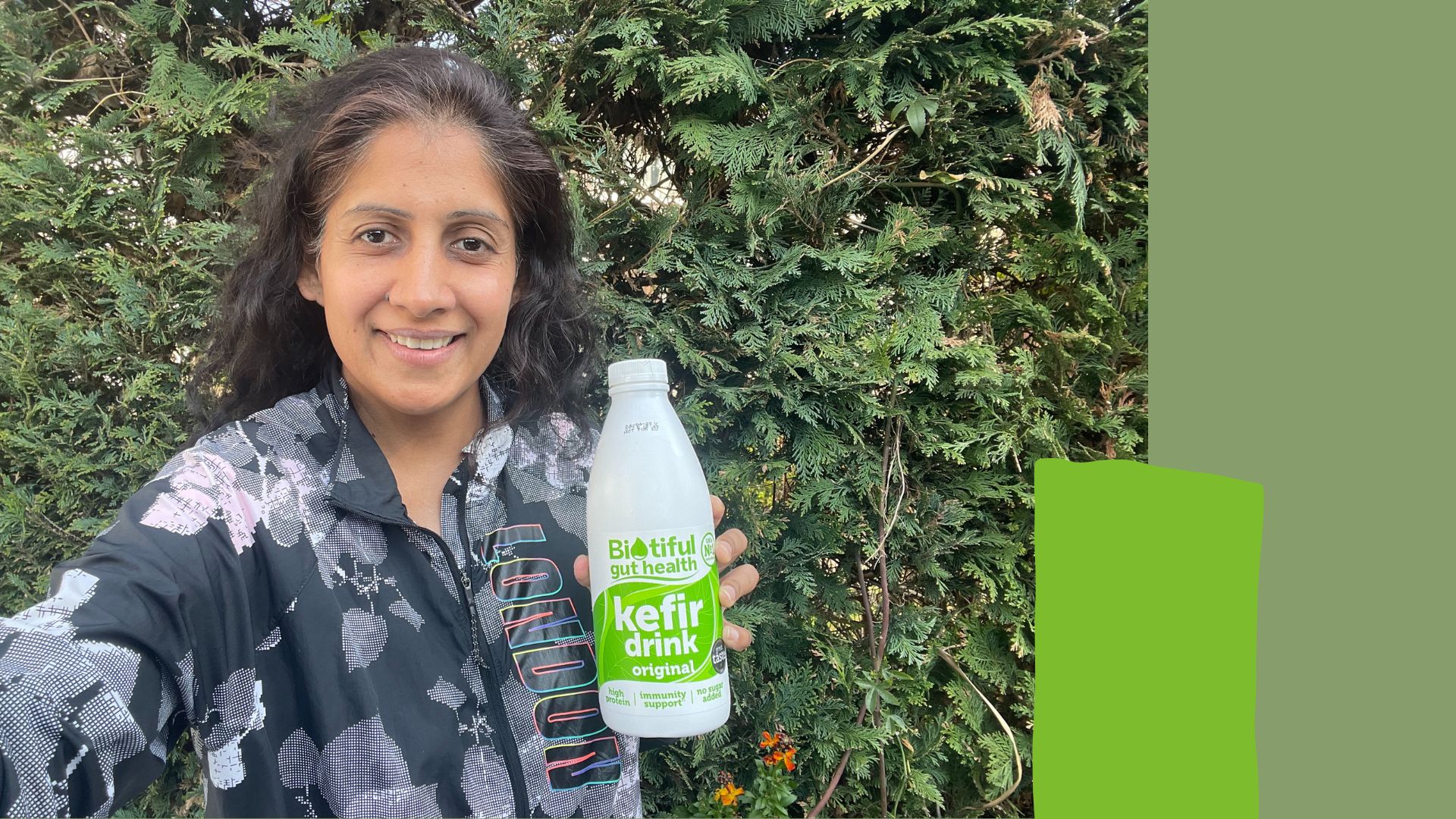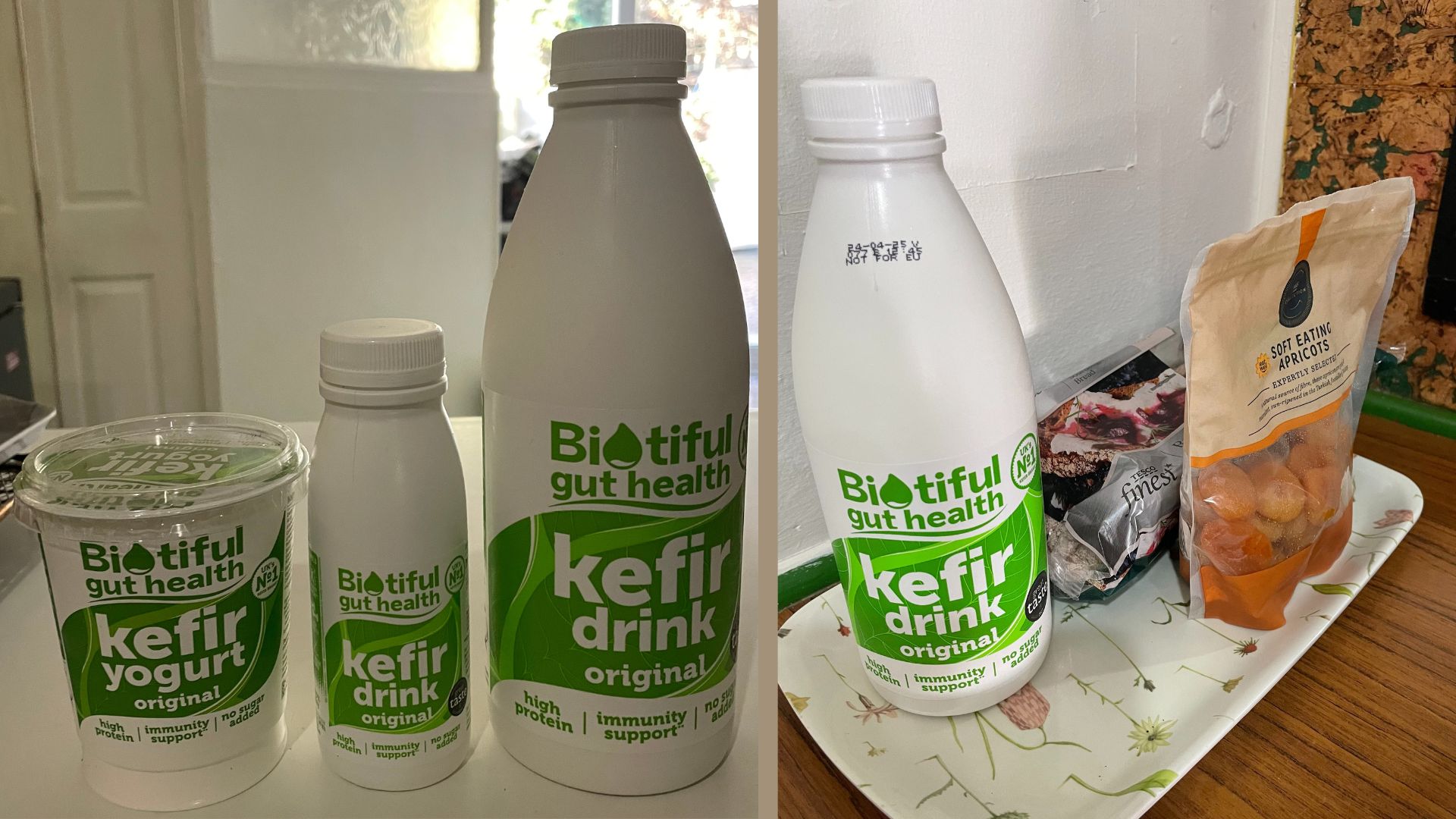I swapped my regular breakfast for 'gut-friendly' kefir - these are the real benefits of the drink
You might have heard of the benefits of drinking kefir, but are they really all they're cracked up to be? Minreet Kaur finds out.


Kefir is one of those foods you might have walked past in the supermarket a thousand times over the years, without glancing at it twice. However, the rise in gut health interest has pushed this ancient drink, once only the go-to for true digestion devotees, into the mainstream.
Now, more people than ever want to learn how to improve their gut health. I'm one of them. As someone who suffers from IBS symptoms, bloating, acid reflux, and constipation, I'd heard probiotic-rich foods like this could make a difference.
I have to admit that I was sceptical at first, but while it's no wonder food, I was pleasantly surprised by the benefits of drinking kefir every day for a whole month.
What is kefir?
Kefir is a fermented milk drink with a slightly sour taste and a light fizz. It's similar to yoghurt, but it's made by fermenting milk with kefir grains (a mixture of bacteria and yeast cultures), which means it's richer in probiotics and has more health benefits.
It's a drink that's been around for thousands of years, with early nomadic shepherds in the Caucasus Mountains thought to have created it. With research on gut health ever-growing and headlines hitting the mainstream that suggest everything is linked to our gut - from how well we age to our mental wellbeing - it's easy to see why it's become so popular in recent years.
As a fermented food, much like kombucha or kimchi, kefir sits among the gut-healthy foods to include in a healthy diet.
I tried drinking kefir every day for a month
After a taste test of the most popular options, I started my month-long trial with a pot of the natural kefir by Biotiful. I took it first thing in the morning, starting with 100ml.
Sign up to our free daily email for the latest royal and entertainment news, interesting opinion, expert advice on styling and beauty trends, and no-nonsense guides to the health and wellness questions you want answered.
On opening the pot that first day, I took a step back. My kefir smelled like milk a few days past its best, but not too bad. I took a deep breath, held my nose, and knocked back the drink as quickly as possible. It had a pleasantly bland taste.
I spent the first week trying to work the kefir into my diet and found it was a good replacement for my pre-workout smoothie, being light on the stomach.
In week two, I upped my intake to 150ml per day. I struggle to eat a lot of dairy at the best of times, so I wondered how this would go, but I was positively surprised. Just two weeks in, I noticed I didn't have my normal sugar cravings after my workouts.
I had 200 ml of kefir every day in week three, and I started noticing I wasn't getting bloated as often as I normally would. As I suffer from IBS, bloating, acid reflux, and constipation from time to time, this was a huge win for me, even though it wasn't a huge difference.
I also started swapping my breakfast for my kefir drink, alongside some almonds and dates, and a cup of masala chai. It kept me full from breakfast until lunch, and I didn't need to snack like I normally do - probably down to the protein content.
In week four, I started drinking 250 ml of kefir. This is when I noticed the biggest difference. I felt full, and my sugar cravings were completely gone. Also, whether it was a placebo effect or not, I'm unsure, but it felt like it was working in my gut. I had far fewer instances of acid reflux and bloating, and I felt like I was sleeping better after going to bed with a full stomach.
I can't say I got used to the taste, even after a month. I know some people love it, but it never grew on me. The benefits of drinking kefir, however, are hard to deny.

Minreet tried the natural kefir by Biotiful, but many other brands and varieties are available in most supermarkets.
Benefits of drinking kefir
1. Boosts gut health
It's well established that kefir can help improve your gut health, with research in the Nutrients Journal and from clinical trials saying as much.
My bloating and occasional acid reflux can impact my life, so I was pleased to see this as one of the benefits of drinking kefir after about two weeks. Undoubtedly, my gut was healthier and happier.
If you're looking to help your digestive system along, it's recommended to drink kefir on an empty stomach. I drank it first thing in the morning.
2. Keeps you fuller for longer
As a vegetarian, I don't always find it easy to get enough protein, and I'm often left feeling hungry between meals. Not in the last month.
Kefir is a good source of protein, with 3.5g per 100ml, working out to almost 9g in my 250ml serving. I felt like I was drinking a protein shake every morning, but without that 'full' feeling in my stomach that would put me off exercise for an hour or so. With my kefir drink, I felt like I could dive straight into the gym, and I didn't need to eat between breakfast and lunch.
3. Reduces risk of disease
“Studies have shown that kefir can improve bone health - for example, bone mineral density in people with osteoporosis," says Dr Sammie Gill, a specialist gastroenterology dietitian and BDA Media spokesperson.
Naturally, this wasn't something I could see in my month-long trial. However, I regularly go to the gym and strength train to support my running habit, so I know all too well the importance of maintaining strong bones, especially as menopause approaches.
Kefir's also known to support heart health, says Dr Gill, by helping to keep blood pressure and cholesterol levels healthy in people with metabolic syndrome.
4. Reduced tiredness
Over time, I felt my energy levels were better than they normally were. I sprang out of bed in the mornings with renewed energy, getting up earlier on some days than others.
It's difficult to put this down to the kefir exclusively, but I think it definitely helped since the benefit came a couple of weeks into my taste test.
Research in the Nutrients Journal also shows that a healthier gut does help us sleep better. As serotonin and tryptophan, two hormones we need for sleep, are made in the gut, it makes sense that having a diet rich in fermented and plant-based foods can help the "production of these sleep-regulating metabolites", helping us sleep easier.
5. May help the immune system
If the gut affects our mental wellbeing, digestion, and even heart health, it's no surprise that it may also impact our immune system.
While it's difficult to say whether I'd have got a cold if I hadn't been drinking my kefir every day, I did get through the last of winter without a sniffle, which is rare for me.
Dr Gill says that kefir is well-known to have "anti-inflammatory effects and suppress the production of inflammatory compounds", pointing to a study by the University of North Carolina.
It has "anti-bacterial effects and can inhibit the growth of harmful bacteria", she says. "It also contains a variety of different vitamins, including B vitamins, which support immune health."
Given that spring is here and I'm still taking the kefir, I'm curious to see how I deal with allergies. Some studies suggest that the gut can also impact how we react to seasonal pollens, and fermented foods like kefir can help the body better react to them over time.
How much kefir should I drink for good gut health?
It's difficult to say how much kefir one person should drink as our digestive systems are all individual. However, Dr Megan Rossi, PhD, RD, APD - aka The Gut Health Doctor - recommends starting with 100ml per day and "working your way up to your preferred portion for up to four weeks".
But while there are many benefits of drinking kefir, as I have found, it's not the only answer to better gut health. "It's a positive addition to your diet, along with other fermented foods like sauerkraut and kimchi," says Lucy Kerrison, a gut health dietitian. "I recommend 150 to 200ml of kefir once or twice a day.".
The verdict on kefir
There are a couple of benefits of drinking kefir that I can say for sure: it helped me with my bloating and constipation symptoms, and made for a better breakfast to start the day with. I also enjoyed it as an alternative to a classic protein powder to have before my workouts.
Is it a miracle drink? No, but as the experts say, it can positively contribute to a balanced diet as one of many gut-healthy foods.
Overall, I feel kefir made a difference after having it daily for a month, but I'm yet to find out whether the taste improves the more you drink it.
This article is for general interest and is not intended to suggest a course of action that might be suitable for you. Always consult a licensed healthcare professional before making decisions concerning your health and wellbeing.
Minreet Kaur is an award-winning journalist, having won report of the year for Skipping Sikh MBE. She has a lot of experience writing on health and wellness as well as culture, feminism, and religion, as featured in the Guardian, Telegraph, Metro, iNews, BBC, Sky, as well as on various radio and television channels.
Bringing together her passion for swimming and running with her desire to encourage others in the South Asian community to get more active through exercise, Minreet became a swimming teacher after the lockdown in 2020 and has since set up a swimming club.
